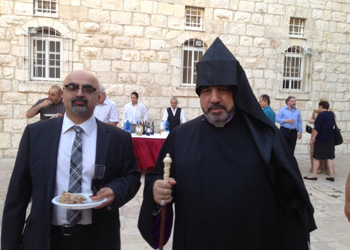Jerusalem Conference Review

The interdisciplinary conference, The Making of Jerusalem: Constructed Spaces and Historic Communities was organised in the Gulbenkian Library of the Armenian Patriarchate of Jerusalem. Held between 2 – 4 July, it was supported by the Armenian Communities Department of the Calouste Gulbenkian Foundation and St. Sarkis Charity Trust, London.
26 scholars from seven countries and various disciplines including anthropology, sociology, and area studies – notably Armenian, Jewish and Ottoman studies – presented their papers. Over the past six years these conferences have covered scholarly developments within Armenian Studies. This year, the conference was open to all scholars who conduct research in humanities and area studies with a focus on the history of Jerusalem after the 16th century.
The conference was officially opened by His Beatitude Nourhan Manougian, Armenian Patriarch of Jerusalem on the evening of 2nd July. The opening roundtable featured esteemed experts from a range of academic disciplines: Michael Stone, Reuven Amitai, Khader Salameh and Tigran Zargaryan.
Jerusalem’s status as a focal point for pilgrimages was discussed in papers presented on the representation of the city by pilgrims and the influence of pilgrimages from ancient to modern times. Some included evidence from fresh historical sources and hitherto unused archives, while others utilised new research methodologies. The history of immigration to and emigration from Jerusalem in the 20th century was also discussed.
The conference demonstrated the need to develop scientific networks in order to create connected histories of the city, as opposed to the segregated communal histories. The closing roundtable discussed challenges researchers face in their work: from having access to archives to building trust.
In his closing comments, Razmik Panossian of the Calouste Gulbenkian Foundation noted the importance of Armenian Studies in a wider context as well as the need to open and improve access to archives, notably through digitisation, to allow wider communities of researchers to benefit from them. The Armenian Communities Department is committed to supporting the digitisation of archives as part of its aim to preserve and make available the Armenian literary heritage.
A volume of selected papers from the conference will be published, edited by Boris Adjemian, Sossie Andezian and Talin Suciyan.
